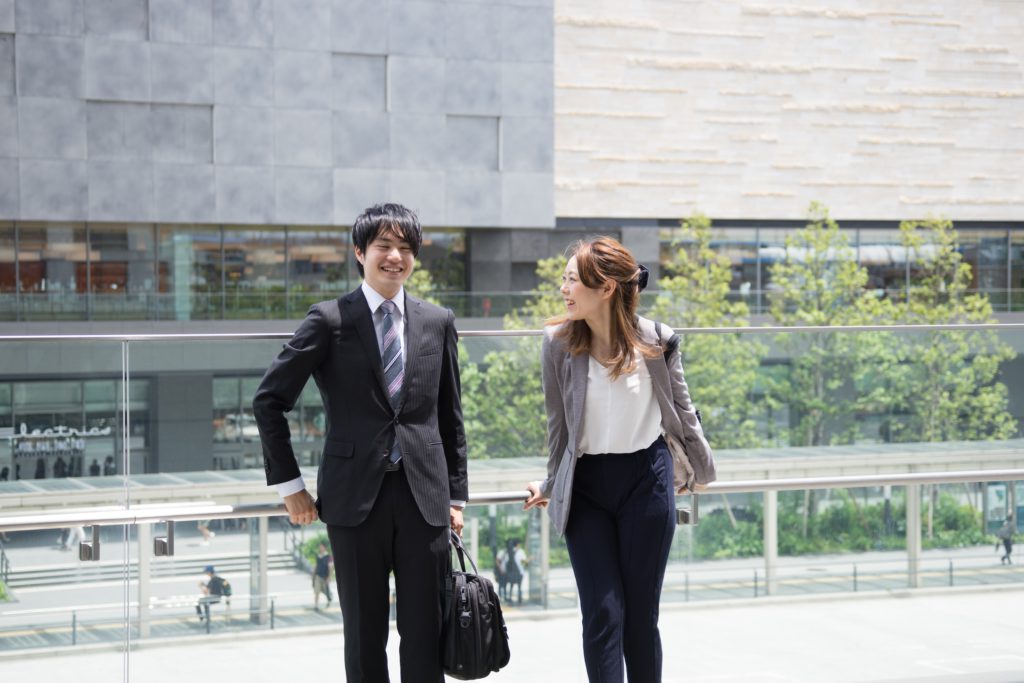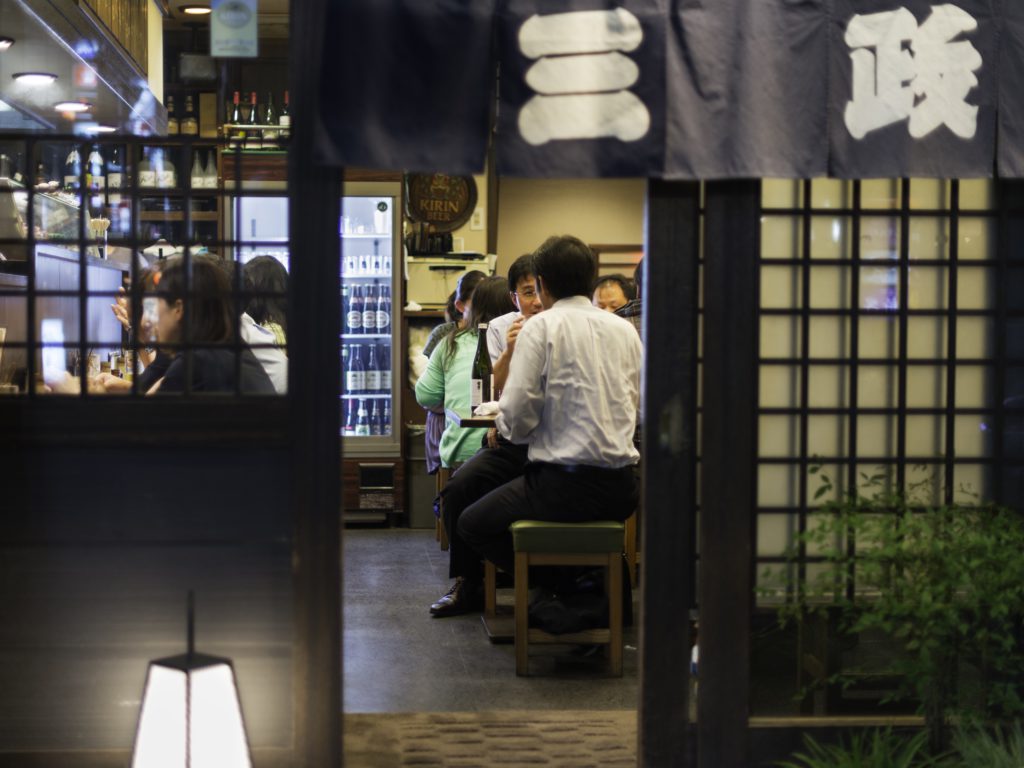Many Japanese companies have specific rules that you should get to know before actually working in Japan. Teamwork tends to be valued over individual success, and a thorough understanding of the culture and manners is deemed equally important as work-related skills. However, you should be aware that these things are viewed as common knowledge, so they won’t be expressly taught when you enter the workplace. When taking on a new challenge in a new environment, first impressions are particularly important. Use this article to learn about the manners and culture of Japanese business, and make them part of your daily routine so that they are second nature to you when you start work in Japan.
How You Greet People Creates a Strong First Impression! Make Sure You Get It Right and Make It Lively

In a workplace where everyone is constantly busy, greetings are one of the most valuable forms of communication. It is common practice in Japan that a kohai (junior) must always greet their senpai (senior) first. This is especially important when you are a new employee, as you need people to remember your face, so you should make an effort to cheerfully and positively greet everyone you meet.
Basic greetings include saying, “ohayo gozaimasu” (good morning) when you arrive at work and “osaki ni shitsurei shimasu” (excuse me, I’m leaving now) when you leave, but there are numerous other phrases you should include at the start of conversations such as “osewa ni natte orimasu” (thank you for your continued support) when addressing clients and “otsukaresama desu” (thank you for your hard work) when addressing colleagues. These expressions are recognized business etiquette for showing respect for the person you are speaking to, and they can be used as a kind of buffer to help your conversation run smoothly. If you are not sure which expression to use in which situation, don’t be afraid to check with a manager or colleague. Using these expressions correctly in business will make you appear trustworthy, so do your best to use them at the right time, in the right place, and on the right occasion.
Don’t I Need to Consider Age and Gender? Use “San” After Everyone’s Name

Usually in Japanese companies, instead of calling someone by their first name, you use their surname with the suffix “san” (e.g. “Sato-san” or “Tanaka-san”). You can use “san” regardless of a person’s age or gender, making it much easier to deal with than its English equivalents: Mr., Mrs., Miss, or Ms.
Surnames such as “Sato,” “Suzuki,” and “Tanaka” are quite common in Japan, and in cases where there is more than one person with the same surname in a company, people may be addressed by their first name followed by “san.” Also, your superiors are often addressed by their surname followed by a suffix signifying their position, such as “shacho” (company president), “bucho” (department head), or “kacho” (section head).
However, you need to be careful when talking to people from other companies. In such cases, you would not use “san” after the name of employees from your own company, but rather would address them by their surname only, with no suffix. This is because when you are outside of your company, your own colleagues are seen as part of your inner circle, much like a family member. Similarly, when referring to people from your company in a managerial role, rather than adding a suffix such as “kacho,” you would refer to them as “our section head ‘x’” without the suffix. It is important to get used to how the Japanese distinguish between “inside” and “outside” in relationships between companies and people.
Being Late Is Strictly Forbidden, But Don’t Be Too Early! Try to Be There Five Minutes Before You Are Due to Start

The most important thing in business is building trust. It is important to think about your general conduct before you even start to worry about the quality of your work. When you are late, it creates the negative impression that you are poor at managing your affairs and have little concept of sociality. Because of this, it is important not only to arrive early for meetings with clients, but also for meetings at your own company. It is expected that you will be there ready and waiting for meetings to begin. However, if you arrive too early, it can cause issues for the other party who needs time to prepare. Therefore, it is recommended that you aim to arrive five minutes before the designated time.
Also, on occasions where you cannot avoid being late due to heavy traffic or sudden illness, you should contact all necessary parties to inform them of this. It is not a problem to call and say why you will be late, but be careful, if you do this later than the designated meeting time, people will think you are unreliable.
Work Together to Produce Great Achievements! Teamwork Is More Important Than Your Work as an Individual

Japanese companies often value teamwork more than the work of an individual. Therefore, when you take a company’s employment test, you will find many questions that aim to find out whether you can work well with others. Cooperation is highly valued in Japanese businesses, as meetings are frequently held to make sure everyone agrees before things get moving, and getting approval for your work takes time as you must seek consent from various parties.
Also, depending on the culture within your company and the nature of your role, asserting your opinion too strongly may create a bad impression as you may appear uncooperative. When and how you express your opinion can play a major part in how people view you, so it is important to be aware of what is going on around you and to learn to read the situation at work.
Make Sure You Communicate Bad News Quickly! Always Follow “Ho-Ren-So” (Report, Inform, Consult)

Most Japanese companies are structured so that there is a separate department for each role, and each department has its own leader. For work to progress efficiently, everyone needs to take responsibility for their own duties, but by everyone working towards their own goals, their team can achieve success.
This is where “Ho-Ren-So” (report, inform, consult) comes in. By regularly sharing what stage your work is at and what you are working on with managers and colleagues, you can carry out your share of the work and spot any problems at an early stage. This mutual support network helps you progress smoothly. Even when you have a matter that must be dealt with urgently, you should always follow the rules of “Ho-Ren-So.”
In Japanese companies, you are taught to share information with colleagues as soon as possible, even when there is an issue or you need to deliver bad news. If you don’t do this and avoid sharing difficult information, it may then lead to an even bigger problem. If you think an issue is trivial and you would rather not speak to your manager directly, discuss it with your senpai or colleagues first. They should each be able to give you valuable advice based on their own accumulated experiences.
By acting in this way, everyone can share valuable information and increase their output as a team.
Looking Smart and Tidy Is More Important Than Being Fashionable – Show You Are a Mature Adult!

In Japanese business, your external appearance is also an important factor, as people will make judgments about your credibility based on how you look. Most Japanese companies expect their workers to look smart and tidy rather than fashionable. The basic dress code for men is a gray, black, or navy suit with a tie. Women have a bit more freedom and are not expected to wear matching suits, but they should wear clothes suitable for the office such as a dress shirt and jacket. You should always check that your dress shirt and suit have no creases and are free from dust or lint. If your role or duties involves meeting clients, you are generally expected to dress more formally than if solely office-based.
In recent years, it has become acceptable not to wear a tie during the summer, and the number of companies that are flexible about what you wear is increasing. However, it is important not to wear fashionable clothing that may cause offense to people you are working with. Women should also avoid heavy makeup, although you should be careful, for in some cases not wearing makeup at all may also be perceived negatively.
How Hard Do I Have to Work? You Only Have a One Hour Lunch Break

In most Japanese companies, lunch breaks only last one hour. You usually get from 12 pm to 1 pm to have a break and eat lunch. Depending on the company, workers may be allowed to take their break at a time that suits them or take turns to have their breaks to avoid a situation where no one is in the office.
While it tends to not be written in official regulations, workers are usually allowed to take short tea breaks or cigarette breaks at their own discretion outside of their lunch hour. Workers who are always office-based may take short breaks between jobs to help them work more efficiently. As each company has its own rules, check with your colleagues and senpai and do your best to take your breaks at a time that is convenient for everyone in your team.
Will I Be Able to Keep to My Set Hours? You Should Be Open to Working Overtime If Necessary

In Japan, many companies operate an 8-hour working day (e.g. 9 am to 6 pm) with a 1 hour break. However, in reality, many people have to work overtime outside of their set hours, and incidents of people dying from overwork due to working long hours have been a problem for some time. According to Japanese law, there is a limit to how much overtime you are allowed to work, but in reality, there are many cases of employees taking work home without informing the company or working unpaid overtime known as “service overtime”.
This has become more tightly regulated in recent years, and as the attitude of workers has begun to change, the number of businesses recognizing the importance of a good work-life balance has started to increase. There are now initiatives such as “No Overtime Day” and “Premium Friday,” where workers are allowed to leave early on the last Friday of the month, but in Japan, where cooperative working is valued highly, there are still many people who feel it is not right to go home if their colleagues in their department are still working. It is important to stand up for your own rights, but when considering the demands of work and the predicament your colleagues are in, you should still be prepared to work overtime when the need arises. If there is a reason why you cannot work overtime under any circumstances, you should explain this at your job interview. It is important that the company is aware of any issues in regards to overtime and that you both come to a mutual agreement.
Is Going Out for Drinks Seen as Part of Your Job? Build Relationships With Your Colleagues Through “Nominication”

In recent years, with the number of young people who don’t drink alcohol rising along with the number of people who want to make the most of their own time, company drinking sessions have begun to decrease. Nonetheless, the custom of using company drinking parties to consolidate friendships among workers has been in place for many years and still exists in many companies. The act of drinking together, being able to reveal your true feelings, and saying what’s on your mind while cementing friendships is so highly valued by workplaces that it led to the invention of the word “nominication”—an amalgamation of “nomi” (to drink) and “communication.” Drinking parties are held at regular intervals for events such as welcome parties, farewell parties, end-of-year parties, New Year’s parties, anniversary parties, and cherry blossom viewing, and are seen as a valuable opportunity to have a good, long catch-up with colleagues that you are too busy to talk to at work.
People will usually first meet up at an izakaya (Japanese pub) and enjoy a wide range of food and drink. After that, many of the party members will choose to go on to somewhere such as karaoke or bowling for “nijikai” (second party). As an end to the evening, remaining people may eat ramen together. Even if you don’t attend every drinking party, showing your face at big events such as welcome parties, farewell parties, and end-of-year parties will give you a chance to talk with colleagues more, which should help work go more smoothly in the future.
Timing Is Essential! Consider What Is Going on Around You Before You Take a Vacation

Japanese companies typically offer around 120 days of annual vacation leave (including weekends). Longer vacation periods include Golden Week, which is from the end of April to the beginning of May; Obon, which takes place around August 10th; and a week’s vacation around New Year’s. When full-time workers have worked for 6 consecutive months or more than 80% of their designated working days, they are entitled to at least 10 days paid vacation.
However, in Japan, many people feel like they shouldn’t take a vacation if their colleagues are still working, and the reality is that in many workplaces, it is difficult to take paid leave whenever you want to. When you wish to take an individual vacation, try to speak to your manager and team members as soon as possible, time things so that you cause minimal disruption to the business, and think carefully about how many days you choose to take. Also, when another member of the staff takes a holiday, foster strong relationships by working with your team to cover for them. Try to create a positive working environment with other team members. If you make an effort, you should be able to build positive working relationships that allow people to take a reasonable amount of vacation time when they want to.
Conclusion
The information in this article should help you get off to a good start in your employment with a Japanese company. Of course, different companies will have slightly different rules and customs, but by getting to grips with the basics outlined in the article, people should embrace you as a member of the company, and before long, you will be performing to your full potential.
If you want to give feedback on any of our articles, you have an idea that you’d really like to see come to life, or you just have a question on Japan, hit us up on our Facebook!
The information in this article is accurate at the time of publication.

